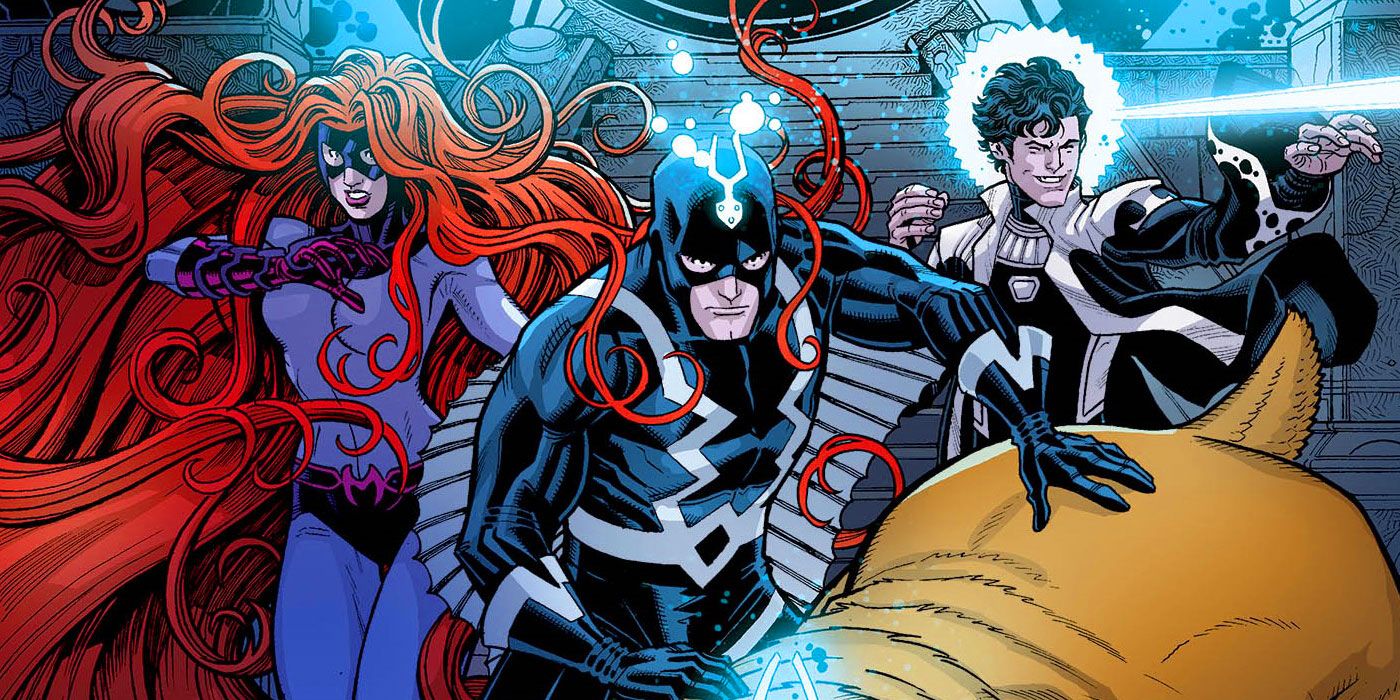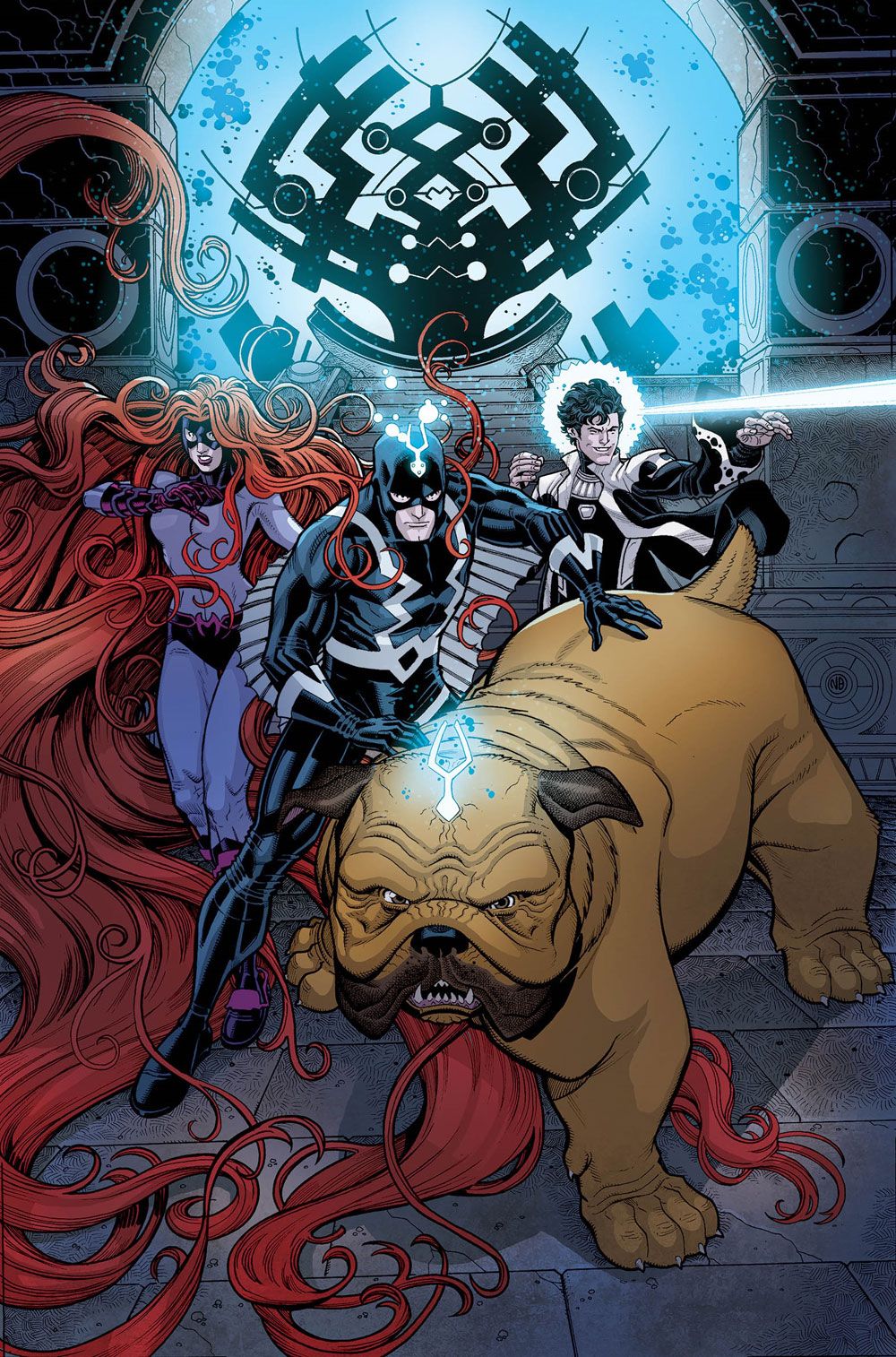In 1965's “Fantastic Four” #45, legendary creators Stan Lee and Jack Kirby introduced Marvel fans to a mythic secret civilization of superpowered beings known as the Inhumans. Eventually, we got to know their Royal family, including larger than life figures like Black Bolt, a monarch with a voice that can crack mountains; his insane mind controlling, brother, Maximus; and Medusa, the Inhumans' fierce warrior queen. The Shakespearean-style drama of the Royal Family has been a pivotal part of the Inhuman mythos ever since, with readers gaining the occasional hint and glimpse of their past, though the full tale of how they came to be has yet to be told.
That changes this August when writer Christopher Priest returns to Marvel and teams with artist Phil Noto for the five-issue “Inhumans: Once and Future Kings” miniseries, announced today at the Chicago Comic and Entertainment Expo (C2E2) and billed as the "definitive origin" of the Inhuman Royal Family. And while the pair have not yet begun work on their collaboration, the planned story will take readers back to a time just after Black Bolt underwent Terrigenesis, when a king now known as the Unspoken sat upon the royal throne of Attilan.
RELATED: New Inhumans Synopsis Teases Military Coup, Royal Family in Hawaii
We spoke with Priest about returning to Marvel, his take on Black Bolt, Maximus and Medusa, and what life was really like for citizens of Attilan during the reign of the Unspoken.
CBR: It feels like an early tale of the Inhuman Royal family would be an epic, almost Shakespearean tale that involves some of Stan Lee and Jack Kirby's most inventive creations. Is that what drew you to this project? And had you written the Inhumans at all during any of your previous stints at Marvel?
Christopher Priest: No, I’ve never written the Inhumans before outside of, perhaps, a brief cameo or two. I was actually surprised and challenged when Marvel offered me the project. I see this series as part of a bigger and more complex overall history. As I see it, we can either bore people to death by trying to be too much, or we can go the “Rogue One” route and tell a fun story which embellishes key points of their origin. I presume if the audience wants to see more of this era of the Inhumans, Marvel will respond.
Approximately how old is Black Bolt when you pick up with him in the first issue of "Inhumans: Once and Future Kings?" Has he undergone Terrigenesis yet? How similar and how different is he from the character we know now?
Neither Black Bolt nor Maximus are much like the characters they ultimately become. For one thing, Maximus is not yet Mad. He is a sane if hardheaded and strong-willed loyal brother, and the two are paired off for this adventure. Now, of course, Max’s unique character flaws give rise to certain rivalries and pettiness which will ultimately divide them but, from the beginning, they are Starsky and Hutch if not quite Quantum and Woody.
I’d prefer to avoid providing definitive ages because that sets off debates, but it’s fair to say the characters in this story are about the same age as the original Lee-Kirby X-Men. Most if not all have undergone Terrigenesis.
What's it like writing a character like Black Bolt, where so much of his communication is not done through dialogue?
I’ve been writing a mute character, Jericho, for more than a year now [in DC Comics' "Deathstroke"]. That has partly prepared me for some of the challenges we’ll face with Black Bolt. I also intend to explore the character’s dimensionality a bit more rather than limit him to seeming too flat or one-dimensional.
What I mean is, if you’ve ever had a deaf friend, you know that reading an email from a deaf person is no different from reading an email from any other person. That was a revelation for me and it changed my way of thinking about my deaf friends, many of whom I’d stupidly regarded as either less engaged or even less intelligent. They’re not. They’re informed, perceptive, brilliant. They are funny. My prejudice had been depriving them of much of their humanity. By allowing Jericho to speak mechanically, I’ve been able to explore the character in greater depth and have him emerge as a more rounded character capable of realizing a much greater potential.
I have a different path laid out for our young Black Bolt; not a mechanical device which would allow him to speak (although, frankly, this is not far-fetched technology. You can probably find something like that at The Sharper Image; surely Attilan technology could devise something), but an emerging way of interpreting not merely Black Bolt’s words but the intent behind them in greater depth and clarity. This presents a direct challenge to Medusa and Maximus, whose interpretations of Black Bolt’s hand gestures have traditionally been the most authoritative.
It sounds like Maximus will have a sizable role in “Once and Future Kings.”
These brothers are partners. They’re similar to Scott and Alex Summers, Chris and Liam Hemsworth. Ultimately, they become a bit more like Cain and Abel, as Maximus’ deep character flaws distract from their bond of trust and creates a wedge between them that grows exponentially until it reaches its ultimate conclusion.
The other important figure in Black Bolt's life is, of course, his wife Medusa. Which aspects of her character do you find most interesting? What's it like writing some of her initial interactions with Black Bolt?
Medusa represents the obvious flaw in a ridged caste system; she was born into a role she is genetically ill-suited to perform. Medusa was never going to host teas or perform ceremonial duties like a royal princess. From birth, she’s wanted to be on the front lines, with her male cousins, engaging the enemy, defending the realm.
At the stage of her life wherein our story is set, Medusa is terribly and completely sick of men falling in love with her. She is weary of all the speculative talk of who she will someday marry or who a prospective love interest might be. She’s a person, dammit, not a farm animal to be groomed and bred.
Our story presents several persistent suitors for Medusa, but she’s interested in none of them -- including Black Bolt. She wants to be accepted, in the same way and on the same level as her male Royal cousins. The man who will ultimately win her over must first prove his acceptance of her as an equal partner in defiance of the stricter roles laid out by the Attilan caste system.
For me, the challenge of writing Medusa is to reveal her humanity and vulnerability without compromising her hard candy shell or writing her one-dimensionally “Hulk Smash!”
Will you get a chance to write much of the other Royal family members in "Once and Future Kings" like Gorgon, Triton, Karnak and Crystal? And if so, which of these characters are you especially enjoying writing?
They’re all in there, and they are a blast to write because what you will see in “OAFK” are these characters in their formative years with relationships just beginning to be explored and tested. “OAFK” is a lot like “X-Men: First Class” with The Inhumans. They are the characters the audience knows and loves but are fresh out of the gate and, therefore, different enough that following their development is fun and exciting.
What's life like for Black Bolt and the Inhumans of Attilan when "Once and Future Kings" begins? Is this story set during the rule of the despotic king, the Unspoken? Is he sort of the central antagonist of your tale?
“The Unspoken” was never a despotic king. He was, in fact, The Good King. The theme of “OAFK” is communication, as the plot revolves around a series of miscommunications and wrong impressions in an operatic if not quite Shakespearean comic tragedy construction.
A young Black Bolt challenges the Good King’s thinking as regards to the semi-slavery imposed upon the Alpha Primitives. In so doing, and quite without realizing it, Black Bolt literally infects the Good King’s conscience to the point where The Good King begins to reevaluate his posture toward the Alphas if not the entirety of the Attilan caste system.
This ends up setting off a chain of events that leads to Black Bolt, Medusa and Maximus fleeing Attilan, with the help of a new friend, and taking refuge in the far away mythical land of Manhattan.
It seems like part of the fun of "Once and Future Kings" is the fact that this is a story that can be many things: an action story, a tale of intrigue, romance, and perhaps even involve some humor. Is that a fair description of what we'll see? What can you tell us about the action and sort of overall feel of the book?
I’m not at all certain I am capable of writing a comic book that doesn’t have humor in it. Your description is spot-on. Rock and roll in two different worlds.
MINOR SPOILER: In the original comics, I found it ironic that The Good King Whose Names Is Unspoken was condemned, primarily, for wanting to destroy a terrible weapon designed to wipe out all of mankind. Yes, there were allusions to the Good King becoming The Mad King, but Black Bolt ultimately challenged his monarch because The King had stolen, with intent to destroy, The Slave Engine.
Now, I’m unclear of how that choice makes Black Bolt a “pure” hero any more than his attempts to destroy an obvious weapon of terrible evil made the King a “Mad” King. In that sense, “Once And Future Kings” is kind of a circular firing squad; a “Game of Thrones”-ish mashup of shifting alliances and changing motives.
If we get this wrong, this will be a confusing mess. If we get it right, “Inhumans: Once And Future Kings” will, hopefully, be a story debated over long after I’ve been drubbed out the business.
Finally, your last work for Marvel was in the early 2000s. What's it like coming back to the company? Is there a possibility of more Marvel work from you after "Once and Future Kings?”
I hope so. Marvel has always been home. And it’s not like I’ve been in exile; I’ve had many conversations with the company over the years, but could never find quite the right project at the right time. Landing “OAFK” was really too easy. It was a project I wanted to do and something Marvel wanted me to do. I was a little shell-shocked at how easy the handshake was. We’d typically had these multi round-robins looking for projects or my pitching my own, which is [gouges his eyes out] exasperating for both for editors and talent.


